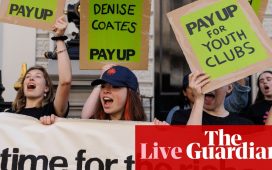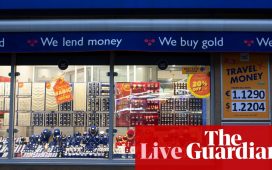Key events
Oil prices fall 2% on US crude stocks
Oil prices are tumbling after industry data showed US crude inventories rose more than expected,
Brent crude futures dropped by $1.50 a barrel, to $74.54 a barrel while US crude fell by $1.50 to $70.24 a barrel, both down by around 2%.
US crude stocks rose by 1.64m barrels last week, Reuters reported citing market sources and figures from the American Petroleum Institute.
Oil prices are still up by 2% this week, though, amid worries about the continuing conflict in the Middle East.

Joanna Partridge
Taylor Swift fans and Olympic visitors pushed record-breaking numbers of passengers to travel through Heathrow between June and September, leading the airport to raise the possibility of reinstating its dividend for the first time in four years.
The airport said it saw consecutive weeks with record passenger numbers during the summer, with a total of 30.7 million travellers passing through from June to September. This brought the total number of passengers for the first nine months of the year to 63.1 million.
Heathrow said it saw a late summer spike in departures thanks to Olympic travellers enjoying European city breaks following the Paris games, as well as music stars playing in London, where Bruce Springsteen, Kylie Minogue and Shania Twain all took to the stage.
The airport experienced the busiest day for departures in its history on 24 July, followed by its busiest-ever arrivals day on 2 September.
As a result, Heathrow has increased its 2024 passenger forecast to 83.8m, up from the 82.4m it forecast in April.
The airport also raised the prospect of restarting its dividend this year. It said in a statement to the stock market that no dividends are currently forecast for 2024, but are “probable subject to financial performance”.
It comes as Heathrow made a pretax profit of £696m in the first nine months of the year, compared with £618m during the same period a year earlier.
Finance bosses eye fresh UK return to office push, KPMG says
More than three quarters of Britain’s financial sector bosses plan another push to get workers to spend more time in the office over the next 12 months, according to a survey of 150 industry leaders by KPMG UK.
The findings, shared with Reuters, also showed more than a third of those bosses will expect employees to be in the office at least four days a week.
Many employers have struggled to lure their workforces back to the office since the pandemic, when lockdowns forced millions to work from home.
An earlier study by KPMG in July 2023 found just 10% of financial services staff wanted to work in the office full time.
But the reluctance to return to pre-pandemic working patterns has led to a sharp drop in occupancy rates at many expensive city centre headquarters and junior staff are finding it tougher to work from home than older workers, some bosses argue.
Some are also worried about the regulatory and risk pressures posed by hybrid working, though 58% of those polled said flexible working could help their firms be more competitive.
Amazon has decreed a five-days-a-week office-working policy, and one of its top executives told staff this month they should look for a job elsewhere if they did not like the policy, echoing similar sentiments expressed by executives at Goldman Sachs and JP Morgan.
According to the latest KPMG survey, bosses intend to monitor office attendance in various ways, with 45% planning to track staff using swipe systems and just under a third saying they would install digital cameras.
Karim Haji, global and UK head of financial services at KPMG, said:
There is no one-size fits all approach to this and businesses are still trying to find the hybrid working sweet spot more than two years on from the pandemic.
Leaders see the commercial value of hybrid working models, particularly when it comes to attracting and retaining talent, but they are still expecting greater office attendance in the coming months to retain collaboration with colleagues and clients.
Volvo expects sales growth to stall

Jasper Jolly
Volvo Cars has said it expects sales growth to stall through to the end of the year as demand drops across the global car industry.
The Swedish carmaker said it will experience “minimal volume growth during the fourth quarter”, and cut its forecasts for sales across the whole year. It said it expects sales growth of 7% and 8%, down from an earlier forecast of 12% to 15%.
Car companies around the world are battening down the hatches as sales slow, amid higher interest rates and slowing economies in some key markets.
The slowdown has also prompted several companies to slow their transition to battery electric vehicles, because manufacturers for now make less money on the cleaner technology compared to petrol and diesel. Volvo last month delayed its plan to sell only battery electric cars by 2030, opting instead to continue to sell hybrids.
The carmaker, which is owned by China’s Geely Group, said today that “weakness in the market has recently accelerated” across the entire car market. That has also dragged down demand for premium cars, such as its £96,000 EX90 electric SUV.
Volvo said that “the car market in the company’s main regions of Europe, China and the US is increasingly under pressure which affects demand”. Jim Rowan, Volvo’s Scottish chief executive, said:
Our industry is facing an increasingly volatile environment. Macroeconomic headwinds are intensifying, as is geopolitical complexity.
The company expects premium sales to increase by only 1% this year. The premium segment had previously been more resilient than the market for cheaper cars. Volvo will also have to contend with tariffs on Chinese imports to Europe, the US and Canada, which will affect its ability to export from Chinese factories.
Here’s our full story on the UK’s competition watchdog’s decision to launch a formal investigation into the £3.3bn takeover of the UK soft drinks maker Britvic by the Danish brewer Carlsberg.
Reckitt ‘thriving’ in China, says CEO
Reckitt Benckiser boss Kris Licht said the consumer goods company’s business in China is “thriving” with double-digit sales growth there while rivals struggle.
The company, whose products include the stomach pill Gaviscon and Durex condoms, posted a 0.5% drop in like-for-like sales in the third quarter, but this was not as bad as feared. Analysts had pencilled in a 1.7% decline.
Reckitt took a £100m hit to sales of its Mead Johnson baby formula powder after a tornado damaged a key warehouse in the US in July.
Reckitt shares rose by about 3%, making it one of the biggest risers on the FTSE 100 index. The stock fell sharply earlier this year as investors worried about an internal investigation into its Middle Eastern business and litigation over its premature baby nutrition formula Enfamil made by its US-based Mead Johnson division. The company is considering whether to sell the business.
Licht’s remarks on China contrast with other companies such as L’Oréal, which yesterday blamed worsening demand in China for weaker-than-expected quarterly sales. And Procter & Gamble, the world’s biggest consumer goods company, was downgraded by some analysts in recent months due to its exposure to China.
China’s economy has struggled to recover since the Covid-19 pandemic, and grew at the slowest rate since early last year between July and September.
Licht said Reckitt, whose Dettol disinfectant is popular in China, regularly launches products in the country on an initially exclusive basis, before launching them elsewhere, and the company has invested in China in recent years. He told Reuters:
Our business in China is thriving, and we’re seeing double-digit growth in that business year on year.
We’re feeling very optimistic, actually, about our business in China.
Adam Vettese, market analyst at eToro, said:
Some investors may have been fearing the worst this morning as Reckitt issued their latest trading statement. The firm is beset with legal issues in relation to its baby formula product and a multi-million dollar verdict hanging over them. Instead, there was a sigh of relief as the company, whose brands include Nurofen, Dettol and Durex, reported better-than-expected like-for-like sales than analysts expected. The health division did a lot of the heavy lifting.
Shares have climbed 20% since plunging to decade lows off the back of the legal issues, which is great for any opportunists that got in at that level and somewhat of a relief for longer-term investors, although they are not out of the woods yet. The firm says it is on track to meet its full year guidance which I’m sure shareholders are happy to hear. It is the legal woes however that they really want to see the end of.
McDonald’s shares fall after E coli outbreak
McDonald’s shares have dropped 6% in pre-market trade, after news of an E coli outbreak that resulted in at least one death was linked to the fast food chain’s “Quarter Pounder” hamburgers, according to US public health authorities.
The US Centers for Disease Control and Prevention (CDC) said on Tuesday that there have been 49 cases in this outbreak which spans 10 states. Ten people have been hospitalized in this onset of cases. The CDC said:
This is a fast-moving outbreak investigation. Most sick people are reporting eating Quarter Pounder hamburgers from McDonald’s and investigators are working quickly to confirm which food ingredient is contaminated.
The agency noted that “McDonald’s has pulled ingredients for these burgers” and they won’t be available for purchase in some states. Most of the people who have fallen ill are in Colorado and Nebraska, officials said.
Let’s get back to the rallying dollar, and the “Trump trade” which has lifted the US currency against a basket of rivals – along with stronger economic data that led markets to scale back expectations of interest rate cuts.
The dollar index rose by 0.2% to 104.36, the highest since early August. Against the pound, the dollar ticked up to $1.2984 this morning.
Alix Stewart, fund manager at Schroders, explained on BBC radio 4’s Today programme:
Markets seem to be pricing in pretty much in line with the betting markets, which are now moving pretty much in Trump’s direction. Actually, when you look at the polls, it is much, much closer.
Looking at the wider impact of a second Trump administration, she said:
If it’s Trump with a clean sweep so he has both houses, then it’s expected that he can enact more contentious policies, like his tariff policy, which would obviously have impacts on inflation and also the cost of borrowing longer term in the US.
The International Monetary Fund has warned that the trade tariffs favoured by US presidential candidate Donald Trump could hurt global growth, as it upgraded its forecast for the UK economy.
Q: So how do those policy decisions impact inflation and therefore the cost of borrowing?
The tariff trade is one part of it. But people are looking back to when he was elected the last time, and what happened in terms of being quite aggressively going for growth and not being quite so bothered about the public debt limits and how much he’s borrowing. And obviously that’s one of the things that bond markets particularly are concerned about, particularly in terms of the cost of borrowing.
Lloyds backs upcoming budget

Kalyeena Makortoff
Lloyds Banking Group has backed the Labour government’s upcoming budget and played down the impact of potential tax hikes, which its chief executive said would likely be part of a “constructive, pro-growth agenda.”
The bank’s support for Labour’s agenda will come as a boost to the government, as it faces criticism from some employers over plans to increase workers’ rights and hike employer national insurance contributions (NICs).
Chief financial officer William Chalmers would not be drawn on the potential impact of specific tax proposals on Lloyds – including raising NICs, or the potential cancellation of stamp duty exemptions. However, he said he welcomed a budget package that was “consistent” with government pledges to kick-start growth and investment in key areas like energy, infrastructure and housing.
“Whatever the tax changes might be, we believe that they will be pursued in the context of a constructive, pro-growth agenda. And it’s that overall balance that we’re really looking for, and indeed it’s that overall balance, that pro-growth agenda, that we would seek to be a part of going forward.”
Lloyds has been working more closely with Labour in recent months, with the party having launched a charm offensive in the City in the run-up to July’s general election.
Last year, chief executive Charlie Nunn started advising Labour on its investment plans as part of its British Infrastructure Council, which relaunched last week as a government taskforce. And earlier this month, the bank was a headline sponsor of the government international investment summit, which is said to have come with a price tag of up to £250,000.
Co-op boss: Real living wage rise lifts wage bill by £100m
The boss of the Co-op Group said the impact of mooted business tax hikes, such as employers paying national insurance on their workers’ pensions, will cost the company “millions” while the real living wage increase has increased its wage bill by £100m.
Shirine Khoury-Haq welcomed Labour’s proposed workers’ rights package but, like business groups, urged the government to introduce the measures in consultation with businesses. Speaking on BBC radio 4’s Today programme, she said:
Please give as much advance warning as possible and work with business to be able to implement this in a considered way.
Asked about the impact of the rumoured rise in employer national insurance contributions (NICs) that the government could announce in the budget next Wednesday, she said:
It’s in the millions. We’re still working that through, but it is a significant impact, as the real living wage increase was as well, our wage bill increased by about £100m. For me as a business leader, I have to balance wanting to pay my colleagues absolutely fairly and linking pay to inflation as it should be with how we run our business and how we make sure that we can continue to maintain the profitability that we need.
Business groups have warned that the NICs rise could hit hiring and limit pay rises, but the Co-op chief executive said it would have no impact on pay rises at the company, which employs 65,000 people.
Absolutely not the case. They will be getting the pay increases we have committed to paying the real living wage. The question then becomes, how we balance everything else in the business to be able to afford that.
Employment rights reforms could cost businesses up to £5bn a year, according to the government’s own analysis, which also found the changes will benefit low-paid employees the most, with some shift workers potentially earning an extra £600 a year.
Khoury-Haq also called for an overhaul of the business rates system.
We’ve long called for reform of the business rate system, which we believe is fundamentally broken. And you only have to look at our UK high streets to see that it’s an issue for us. Our business rates have increased £20m over the last two years. That’s 20% up to £111m per annum. So we are hoping that the budget will address that in order for us to be able to revitalise our high streets.
Real living wage rises to £12 an hour as cost of living crisis continues
Almost half a million workers in the UK whose employers are signed up to pay the voluntary real living wage are in line for a pay rise to at least £12 an hour, taking their annual wage to £3,000 a year above the government’s minimum wage.
The Living Wage Foundation said employers in London that are part of the scheme will pay an enhanced rate of £13.15 an hour to cope with the extra costs of living in the capital.
According to the charity that sets the rate, the rise was needed after research found the cost of living crisis continued to affect many of Britain’s low-paid workers.
It said recent polling of those earning below the real living wage found 60% had visited a food bank in the past year and 39% regularly skipped meals for financial reasons.






